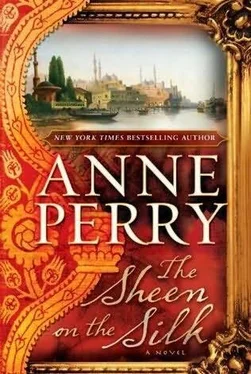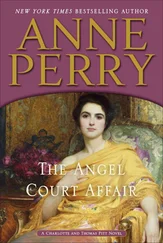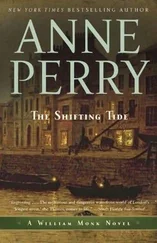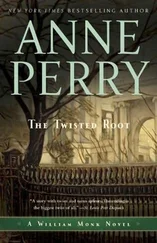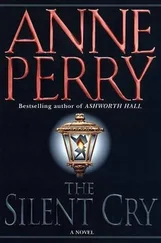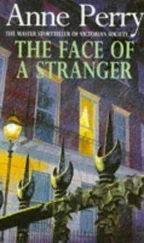He turned and went inside. It was time for him to walk to the Vatican and present himself to the pope. He had been sent for, and he must make certain he was there well in time. He did not know the reason Gregory X wished to speak to him, but he profoundly hoped that it would be the chance of office again-and not merely as secretary or assistant to some cardinal or other.
He increased his pace along the street, his long bishop’s robes swirling. He nodded to people he knew, exchanging a greeting here and there, but his mind was on the meeting ahead. Perhaps he would be sent as a papal legate to one of the great courts of Europe, such as Aragon, Castile, Portugal, or, above all, the Holy Roman Empire. Any such position would offer vast opportunities out of which could be carved a superb career, possibly even elevation to the papal throne itself one day. Urban IV had been a papal legate before his election.
Five minutes later, Palombara walked across the square, up the wide, shallow steps of the Vatican Palace, and into the shade under the huge arches. He reported his presence and was conducted to the pope’s private apartments, still fifteen minutes before the appointed time.
As he expected, he was kept waiting. He did not feel free to pace back and forth over the smooth marble floor as he would have liked.
Then suddenly he was summoned, and the next moment he was in the pope’s chamber, a formal room still, but brighter and more comfortable. Sunlight streamed in through the window, making it seem airy. He had no time to look at the murals, but they were in softer colors, muted pinks and golds.
He knelt to kiss the ring of Tebaldo Visconti, now Gregory X. “Your Holiness,” he murmured.
“How are you, Enrico?” Gregory asked. “Let us walk in the inner courtyard for a while. There is much to discuss.”
Palombara rose to his feet, noticeably taller and leaner than the rather rotund figure of the pope. He looked down into the pope’s face with its large, dark eyes and magnificent nose, long, heavy, and straight. “As Your Holiness pleases,” he said obediently.
Gregory had been pope for two and a half years already. This was the first time he had spoken with Palombara alone. He led the way out through the wide doors into the inner courtyard, where they were observed but not overheard.
“We have much work to do, Enrico,” Gregory said quietly. “We live in a dangerous age, but one of great opportunity. We have enemies all around us. We cannot afford dissension within.” He glanced at Palombara sharply.
Palombara murmured a reply to show his attention.
“The Germans have chosen a new king, Rudolph of Hapsburg, whom I shall crown Holy Roman Emperor in due time. He has renounced all claims to our territories, and to Sicily,” Gregory continued.
Now Palombara understood. Gregory was clearing all threats one by one toward some further great plan.
They crossed into a brief open space, and Palombara shaded his eyes against the sunlight so he could read Gregory’s expression.
“The power of Islam is increasing,” Gregory continued, his voice growing sharper. “They hold much of the Holy Land, all Arabia south and east, Egypt and North Africa, and up into the south of Spain. Their trade is expanding, their science and their arts thrive, their mathematics, their medicine, lead the way in thought. Their ships sail the eastern Mediterranean, and there is nothing to stop them.”
Palombara felt a chill in the air in spite of the brilliance of the sun.
Gregory stopped. “If they move north toward Nicea, and they well could, then there is nothing to stop them taking Constantinople, and the whole of the old Byzantine Empire piece by piece after that. Then they will be at the very gates of Europe. Disunited, we will not stand.”
“We must not permit it to happen,” Palombara said simply, although the answer was anything but simple. The two-hundred-year-old schism between Rome and Byzantium was deep and had resisted all previous attempts at reconciliation. They were now not only doctrinally apart on many issues, most intractably the issue of the Holy Spirit proceeding from the Father and the Son or the Father only. They were also culturally different in a hundred patterns, beliefs, and observances. These distinctions had become a matter of human pride and identity.
“The emperor Michael Palaeologus has consented to send delegates to the council I have called in Lyons this June,” Gregory continued. “I wish you to come also, Enrico. Listen carefully to everything that you hear. I need to know my friends, and my enemies.”
Palombara felt a surge of excitement. Healing the schism would be the greatest single achievement for Christianity within the last two centuries. Rome would control all the land and command the obedience of every soul from the Atlantic to the Black Sea.
“How can I serve this cause?” Palombara surprised himself with how honestly he meant it.
“You have a fine mind, Enrico,” Gregory said smoothly, the harsh lines of his face softening. “You have great skills, a nice balance between caution and strength. You understand necessity.”
“Thank you, Holy Father.”
“Do not thank me, it is not flattery,” Gregory said a trifle tartly. “I am merely reminding you of the qualities you possess which will be needed. I wish you to go to Byzantium, as legate of the Holy See, with special duties to end this quarrel which divides the Christian Church.”
A smile curved Gregory’s wide lips. “I perceive you have grasped the vision. I knew you would. I know you better than you imagine, Enrico. I have great faith in your skill. As always, of course, you will be accompanied by another legate. I have chosen Bishop Vicenze. His abilities will be the right complement for yours.” There was a flicker of amusement in his eyes, almost too slight to be seen, yet for an instant it was unmistakable.
“Yes, Holy Father.” Palombara knew Niccolo Vicenze and disliked him profoundly. He was single-minded, unimaginative, and dedicated to the point of obsession. He was also completely without humor. Even his pleasure was ritualistic, as if he must follow a precise order or lose his control over it. “We will balance each other, Holy Father,” he said aloud. It was his first lie of the encounter. If he were pope, he too would have sent Niccolo Vicenze as far away as possible.
Gregory permitted himself a wide, generous smile. “Oh, I know that, Enrico, I know that. I will look forward to seeing you in Lyons. I think perhaps you will enjoy it.”
Palombara inclined his head. “Yes, Holy Father.”
In June, Palombara was in the central French city of Lyons. It was hot, dry, and dusty underfoot. He had watched and listened all week as the pope had commanded, and he had heard a score of opinions, most with little presentiment of the danger from the east and south that Gregory perceived so sharply.
The promised delegates from the emperor of Byzantium were not here yet. No one knew why.
Now he walked up a flight of shallow steps to the thoroughfare above. Ahead of him was a cardinal in purple, his robes vivid in the June sun. Lyons was a beautiful city, dignified and imaginative, built upon two rivers. This month, the men and women in the streets and byways were used to the sight of princes of the Church and they took no more notice than a polite bow or curtsy, and moved on about the business of their lives.
Palombara turned, hearing a disturbance in the street ahead, movement, men stepping aside. There was a flowing of color, purples and reds and whites, and flashes of gold, like wind in a field of poppies. King James l of Aragon came out of one of the great palace entrances, surrounded by courtiers. Everyone made way for him.
He was totally unlike the bold and arrogant Charles of Anjou, king of the Two Sicilies, which in effect meant all Italy from Naples southward. Charles was as unsaintly as possible, yet it could be he who would lead the crusade that the pope so badly wanted. It was an interesting contrast in the holy and practical, one that Palombara was contemplating with some indecision.
Читать дальше
